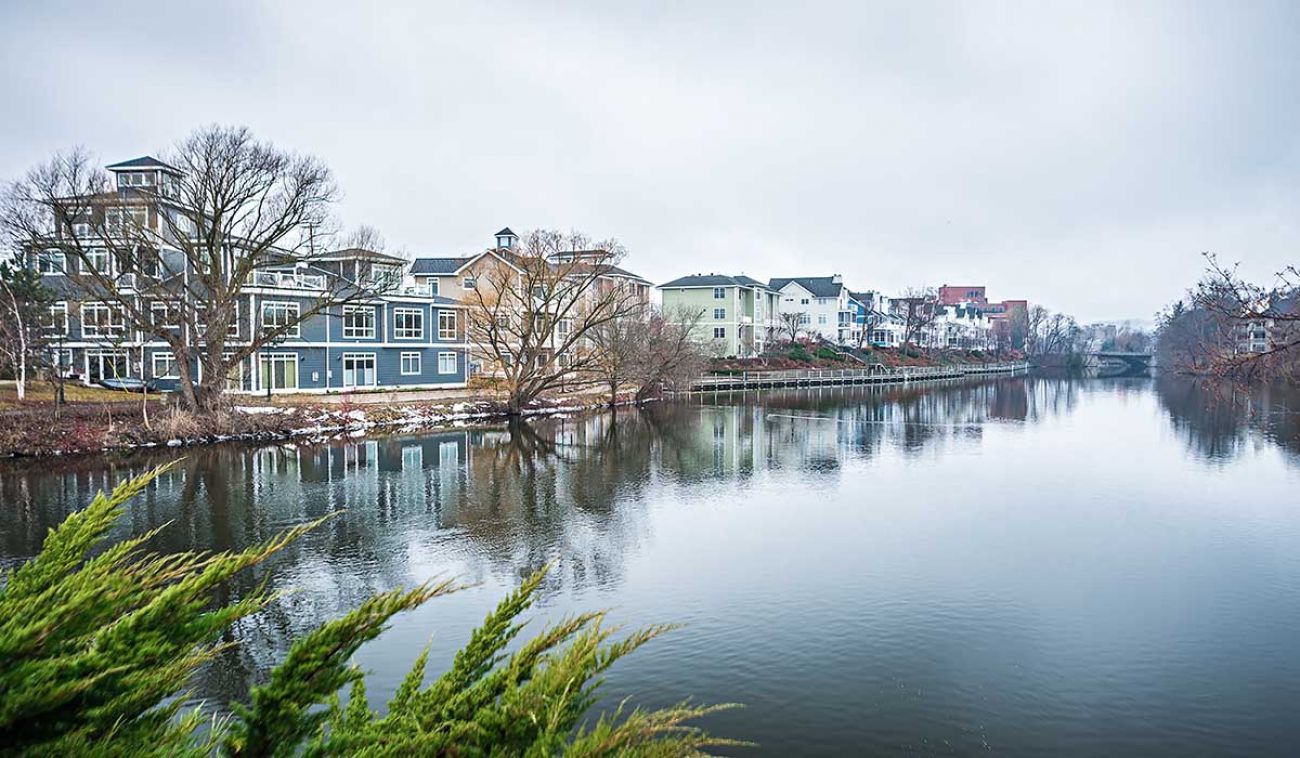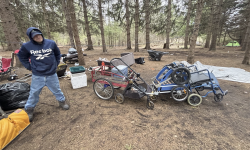Northern Michigan to downstate residents: Stay home during coronavirus!

The resort havens of Traverse City and Petoskey are among the jewels of Michigan tourism.
But not this week.
From the mayors in these lakefront towns, to a mother of two young children in Manistee County and members of a Facebook group in Leelanau County, the message to downstate Michiganders is pretty clear:
Stay away.
They fear that part-time owners or renters of homes might bring the coronavirus to their — so far — lightly infected, less-populated communities, where they say a traveler-driven surge in cases could overwhelm small health care systems.
“If you have friends and family downstate figuring since they are out of work they may as well just come UpNorth to the cottage, please encourage them not to,” Traverse City Mayor Jim Carruthers wrote on Facebook Monday.
- The latest: Michigan coronavirus map, locations, updated COVID-19 news
- What Michigan’s coronavirus stay-at-home order means for residents
- As Detroit ICUs fill, officials ask outstate hospitals to share the load
“The possibility of bringing infection from areas with more covid19 positive results to areas with less, like the Grand Traverse region, is highly possible.”
Petoskey Mayor John Murphy told Bridge Magazine that limited medical resources — of medical staff, beds and ventilators — at hospitals in Emmet and Charlevoix counties would not “be enough to handle the onslaught if it comes full force.”
“People should do what they’re supposed to do, stay in their homes and not travel,” Murphy said.
Those putting out the non-welcome mat say they are eying with trepidation an explosion of confirmed cases of COVID-19 in metro Detroit, notably in Wayne, Oakland and Macomb counties — which represent about 38 percent of Michigan’s population but 85 percent of its positive cases. The three counties had more than 1,900 cases by Wednesday afternoon. In contrast, counties in northwest lower Michigan had a total of 17.
Earlier this week, Gov. Gretchen Whitmer’s “Stay Home, Stay Safe” order banned most non-essential travel. But the decree specifically allows “travel between two residences in this state.”
Grand Traverse County Health Officer Wendy Hirschenberger said she wants those who decide to travel to their northern Michigan second home to escape the virus to voluntarily self-quarantine for 14 days.
“People who are driving up from downstate or other areas of the country that are high-risk need to self-quarantine for 14 days,” she said in a statement to Bridge. “Symptomatic or not, pretend as if you are carrying it and do your part to slow the spread.”
If they come, Hirschenberger said, she advised them to use delivery services, rather than entering local grocery stores or pharmacies, until their quarantine concludes.
The Traverse City Record Eagle reported that the largest hospital in northwest Michigan — Munson in Traverse City — had 29 adult ventilators. The entire Munson Healthcare system, including seven owned and two affiliated hospitals across northern Michigan and St. Ignace had 81 ventilators, the newspaper reported.
Concern and, in some cases, anger from year-round residents of popular vacation areas have resounded across the United States, especially in coastal communities along the nation’s eastern seaboard, and virtually anywhere second homes are a half-day or less drive from infection hotspots like New York City.
There was a backlash among locals aimed at wealthy New York City residents fleeing to the Hamptons, the Catskills and the Jersey shore where they own second homes. Besides fear that they will bring the virus with them, locals say visitors are clearing the shelves in their grocery stores.
On Saturday, New Jersey Gov. Phil Murphy sent out this tweet: “I urge those who have homes at the Jersey Shore to NOT go to them at this time. The local infrastructure, especially the health care infrastructure, is not prepared for the influx of part-time residents. Please stay at your primary residences.”
Meanwhile, an influx of private jets are raising concerns among residents of Nantucket island, where the only hospital has limited beds and just three ventilators. The hospital urged part-time residents to stay away “to avoid a potentially dire scenario.”
The case for caution
Bob Kingon knows a lot about infectious diseases. He was a deputy director of the Centers for Disease Control and Prevention in Atlanta for 30 years before he retired and built his year-round retirement home on Elk Lake in Antrim County, just north of Traverse City.
Kingon, 79, lives there full time with his wife, Karen, and has been active as a planning commissioner in Milton Township and on volunteer boards aiming to protect northern Michigan waterways.
He said Hirschenberger’s 14-day quarantine advice — similar to a restriction Florida Gov. Ron DeSantis announced as mandatory this week for travelers on all flights coming to Florida from New York or New Jersey — was an excellent solution.
Kingon noted that it’s not just second homeowners who have returned or soon will to the region that might raise concerns. Many of the region’s retirees spend winter weeks or months in warmer climates, especially Florida and Arizona. They would be wise to also follow the 14-day quarantine plan when they return, he said.
Kingon himself has a neighbor who would seem to fit the quarantine request.
Tom Kenaya recently drove up to Elk Lake from his primary home in Rochester in Oakland County (543 confirmed cases).
Kenaya, who works remotely for an Internet company, packed up his truck with his three children, ages 10, 12 and 15, and seven coolers of food and arrived at Elk Lake 12 days ago. His wife, Connie, is a medical education specialist at St. Joseph Mercy Hospital in Pontiac. She works remotely but couldn’t join the family because she had to be within 50 miles of the hospital, while working.
“We haven’t left the house except to go outside for fresh air,” said Kenaya, 50, who said he has coronary artery disease. “We’re healthy and we want to stay that way.”
In essence, the family is following the 14-day self quarantine advice.
He said he understands the concerns of people like the Traverse City mayor but he’s taken all precautions to make sure he and his children were healthy before they left Rochester and since they’ve arrived.
“This was a way to get away from the noise, the phone calls the kids were constantly getting from their friends, who wanted to go out,” he said.
His oldest is a student at Brother Rice High School and the two younger children both attend the Rochester Public Schools. Kenaya starts his workday online at 8:30 a.m. and the three children begin later, all taking online classes and spending much of their days on reading assignments.
Warren Call, CEO of Traverse Connect, the lead economic development organization for a five-county region centered in Traverse City, was measured in his assessment of downstate travelers.
He declined to say he would tell second home owners to stay away, but said “there’s a lot of good reason to say if you don’t need to travel then you shouldn’t.”
He said he worries about the health of workers and families. “A strong economy depends on a healthy workforce. We support efforts to flatten the curve, shorten the duration that businesses are closed so, as soon as possible, we can get our local economy back up and running.”
Mayor Carruthers’ Facebook post on Monday provoked plenty of comments, mostly supportive, and 765 shares as of late afternoon Wednesday.
Among those commenting was Beth Joseph, a single mom with children ages 2 and 5 in unincorporated Brethren, in Manistee County.
She posted a meme called “A Local’s Plea” with photos of a small northern Michigan hospital above a shot of the University of Michigan Hospital in Ann Arbor. She added these words: “You may have several hospitals this size within an hour’s drive of your primary home. Many of us have one 10-bed hospital within an hour’s drive of our only home. You are better off staying home.”
She said her anger was inspired by an ad she came across on Instagram, advertising a condo rental at the Homestead Resort near Glen Arbor.
“If you need a place for some social distancing we can help,” the ad read. “Unlimited walking, hiking and bicycle trails available. Our condo is wide open through the rest of March and April.”
She was incensed and let the condo owner know it: “Shame on you! You should be encouraging people to stay home! What hospital beds are folks going to use when they get sick from the virus that they bring with them?”
Even here in our outlying corner of the world, we are seeing people from the cities flooding our area and wiping our shelves clean of supplies we and our elderly population need! -- Julie Rapson
The ad was taken down not long after her post.
“I have empathy for people who have a home up here and want to come,” she told Bridge. “But people profiting off short-term rentals makes me crazy.”
The please-stay-put sentiment is not confined to northwest Michigan. Bridge reported last week on efforts by residents of the Upper Peninsula to have state officials close the Mackinac Bridge to keep the coronavirus from hitting the U.P. (they didn’t, and the disease did).
Related: Some Yoopers want to close Mackinac Bridge to stop the spread of coronavirus
In Oscoda, on northeastern lower Michigan’s Lake Huron shoreline, one resident had her own observations about the downstater invasion in an email she sent to Bridge this week.
“Even here in our outlying corner of the world, we are seeing people from the cities flooding our area and wiping our shelves clean of supplies we and our elderly population need!” Julie Rapson wrote.
It hardly needs mentioning which shelves were cleared first.
“WHAT is so special about toilet paper????” Rapson wrote. “Does it secretly cure COVID-19? Is there something the rest of us need to know???
“They need to stay home, stop coming up here and realize that this is NOT the Apocalypse! It's only a few weeks of isolation!”
RESOURCES:
- Michigan families can get food, cash, internet during coronavirus crisis
- How to give blood in Michigan during the coronavirus crisis
- Michigan coronavirus Q&A: Reader questions answered
- How to apply for unemployment benefits in Michigan amid coronavirus crisis
- How to get tested for coronavirus in Michigan
- The first line of defense against coronavirus: Try soap, not a mask
See what new members are saying about why they donated to Bridge Michigan:
- “In order for this information to be accurate and unbiased it must be underwritten by its readers, not by special interests.” - Larry S.
- “Not many other media sources report on the topics Bridge does.” - Susan B.
- “Your journalism is outstanding and rare these days.” - Mark S.
If you want to ensure the future of nonpartisan, nonprofit Michigan journalism, please become a member today. You, too, will be asked why you donated and maybe we'll feature your quote next time!




